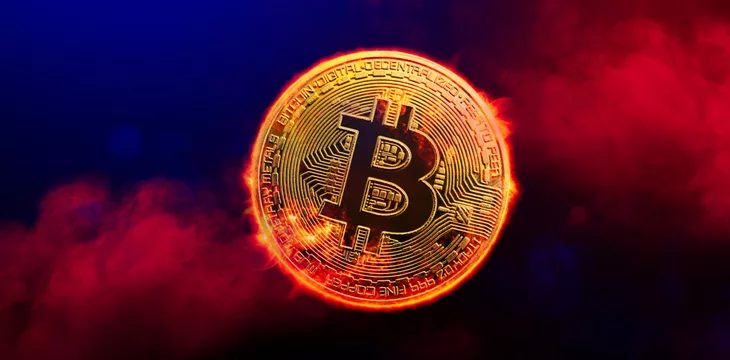|
Getting your Trinity Audio player ready...
|
It’s time to burn down the empty speculation of crypto, and let a world built on blockchain that solves real world problems rise from the ashes. This is a world of on-chain enterprise applications, government services, user-centric Web3, and artificial intelligence (AI). It’s a world where electronic records are secure and more permanent, creating new economies where the users take back control of their own data. The London Blockchain Conference 2024 will explore this world, and it’s inviting everyone to come and take a closer look. Tickets for London Blockchain Conference 2024 are available now, be sure to reserve yours today.
Blockchain—the technology needed to solve real world problems—has proven its reliability over the years. Blockchain can rise from the ashes, but there’s no need to burn anything down, other than the popular perception of what “cryptocurrency” or “crypto”—often associated with blockchain—is.
Are crypto and blockchain the same?
The terms “crypto” and “blockchain” are often interchanged, with blockchain often used as a generic term associated with cryptocurrencies created using the technology. Using the word “crypto” to describe blockchain, however, is an inaccuracy that comes from the early misunderstandings of two distinctly different systems.
Put simply, blockchain is a digital ledger maintained and distributed among multiple interconnected computers. The “blocks” in the blockchain store an accounting of relevant information of a transaction, such as the transaction time, amount and even addresses involved in the transaction.
Crypto, cryptocurrency or digital currency is the medium of exchange, or digital assets that use public ledgers like blockchain to prove ownership. Contrary to popular belief, cryptocurrencies are not encrypted; however, they maintain privacy and security while having a public, decentralized ledger in the form of blockchain.
Oh, but you’ve heard of people who made millions of dollars trading cryptos? It’s true, some did, and some lost…A LOT. Did all that trading create any real value in the real world, or was it just a digital lottery that a tiny percentage of people won? And remember when crypto people used “free the markets, free the world,” or the “crypto economy” as excuses to gamble millions on digital trinkets? Here’s another fact: the few who got rich made all that money from the people who lost it.
What possible justification is there for the coins on CoinMarketCap to have market capitalizations in the billions of dollars? Are they so widely used and accepted in the real world? Are governments and large enterprises around the world running mass-scale applications on their blockchains?
The answer is no, and the market valuations are based purely on the speculation of traders. Most blockchain transactions involve sending assets to and from trading exchanges. The most popular applications running on-chain today are “DeFi” apps, used for… trading digital assets.
How long can this go on? How long can any on-chain asset claim to be “the money of the future” before people start to realize they’re price-speculating on a future that should have already arrived?
Blockchain is here to stay
The public, enterprise-tier blockchain should be a “universal ledger of truth.” It’s a way of timestamping and securing any kind of data, in a way that records who actually owns that data.
In the real world, that means social media where users own all the content they create (as in actually own, not just theoretically) and can earn an income from it without endless ads. It means food and product supply chains that track ingredients from origin to consumer. It means scientific, health, agricultural, and business contract data that will be noticed if it’s altered. It means developers and researchers can get paid for snippets of their work. It means games that are fair as well as fun. It means any other asset (physical or digital) can be converted into a digital token that lives on the blockchain—whether it’s a title deed or national currency, a discount coupon or a concert ticket.
For governments, it means public services are streamlined, improving efficiency while reducing costs. Utilizing blockchain for government services ensures a fairer, more transparent, and more accountable process for all stakeholders.
Blockchain can help businesses operating in large-scale industries—from automotive to food, even pharmaceutical—record their transactions and optimize their accounting processes, with all the information readily verifiable using one single, distributed ledger. Blockchain also ensures data integrity in supply chains since it can be used to track the manufacturing process and even the transport of goods through the chain, taking quality assurance to a whole new level while also making it impossible for any bad actor to falsify data that’s already recorded on the public ledger.
Understanding how a publicly distributed immutable ledger improves a business model or an operation by making it more efficient also makes a world of difference for developers looking to create a solution that solves real-world problems. And with the rising popularity of artificial intelligence (AI) in today’s so-called Web3 world, there’s an even greater need for developers to learn how they can lean on blockchain for their data handling needs. AI needs blockchain to secure the data used in training its models to ensure the transparency and immutability of data.
The time will come when the public stops asking, “how much is the price today?” and starts exploring new ways to earn income from micropayments and creative new business models. Blockchain can still be used for digital assets and yes, it can still even be the money of the future. But the blockchain world needs to grow up and show how useful it really is—and that’s what will be happening in London this coming May.
Learn from the experts on how public enterprise-level blockchain technology will unite governments, enterprises, AI and Web3—secure your spot to the London Blockchain Conference 2024 today.
Watch: Utilizing blockchain tech for data integrity

 02-20-2026
02-20-2026 




